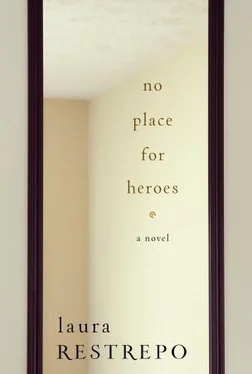“All right, I got it. Now tell me, what’s he like?” Aurelia asked.
“What’s who like?”
“Forcás. What’s he like?”
“He’s good-looking, if that’s what you’re asking.”
“All Argentinean men are good-looking.”
“But this one is twentysomething, eyes and hair the color of honey, wide shoulders. Good-looking guy, I’m telling you.”
“Any specific details? Defects?”
“No one’s perfect. He’s not very tall and he’s bowlegged, as if he just jumped off a horse.”
Las Violetas, a confectionery from the turn of the century, seemed to Aurelia a little too romantic a spot for a political rendezvous. It was truly an art-nouveau jewel, as delicate and ornate as a box of fine chocolates. She felt nervous, and attributed it to what she had to do the following day, or to the lit stained-glass windows of Las Violetas, or to the realization that night was falling at that moment over Buenos Aires. Or maybe because of Forcás, whom she was finally going to meet after so much waiting.
After they had tea in Las Violetas, Aurelia and Sandrita walked a few blocks and went into a café where they had some more tea, during a short informatory meeting with a comrade from the regional directive. He told them about the rumors spreading of the fiasco that had befallen the head of the military junta, General Jorge Rafael Videla, during a trip to Italy. The gossip around Buenos Aires was that the pope had thrown the forced disappearances of hundreds of persons in Videla’s face, and that the Italian press had greeted him by divulging the existence of chupaderos .
On their way back home, meandering to fulfill the rigorous regulations for vigilance, Sandrita and Aurelia took deep breaths of the night air. It was an unforgettable evening when the silence that had always sheltered the dictatorship began to melt, drop by drop, like the snows on top of Monte Tronador.
At a certain point they separated, and Aurelia took a cab to Belgrano R, one of the wealthier neighborhoods in the city. She rang the bell of a Colombian couple who were friends of her mother, to whom her mother had mailed from Bogotá some papers that Lorenza had to sign and return as soon as possible by certified mail. They were inheritance documents relating to the finca that her father had left her in the countryside outside Bogotá.
“A finca called San Jacinto that you never got to see,” Lorenza told her son. “It was a lovely place, a little valley covered in mist in between two blue mountain ranges.”
Along with the documents, Mamaíta had sent money and a letter in her clear and beautiful handwriting, words made uncertain by grief. She had also sent a pair of high-heeled Bally shoes, made of grape-colored suede, which so many years later Lorenza still remembered as if she were holding them in her hands. Ever loving Mamaíta, to think about presents at such a time. And Bally shoes at that, how crazy, who would think of such an extravagance? Of course, in the Argentinean party the women had to dress up, not like in Bogotá or in Madrid, where they all went with the complete identikit: faded jeans, military vest, native backpack, and lace-up boots with thick rubber soles, like those of a construction worker, what her father had called her little communist boots. In Argentina, one had to adopt almost the opposite type of disguise: comb your hair neatly, wear perfume, put on stockings and other feminine accessories. They even wore nail polish, which Lorenza applied with great care. But no Ballys. The Ballys didn’t fit the profile, they were too much.
“That’s funny, so now you were a landlord with this property in San Jacinto,” Mateo teased her.
“I would have done anything for the comrades not to look at me as some well-off girl playing at revolution. But that’s probably how they did see me.”
“And the Colombians?”
“What Colombians?”
“The husband and wife who gave you the shoes you didn’t like.”
“I did like them, they were divine, but I wasn’t going to risk wearing them.”
The Colombian couple wanted Lorenza to have dinner with them, a simple meal, they warned her, just family, and they served a cheese and mushroom omelet. Of course, they knew nothing of her activities in Buenos Aires. They thought she was in school because that’s what Mamaíta had told them. During dinner, as they chatted about nothing in particular, dogs and horses, the wife mentioned in passing that Videla was a great horseman, an outstanding example, and that she admired him because of his role in restoring Argentinean values. A piece of omelet got stuck in Lorenza’s throat, but she remained quiet, and bit by bit the conversation returned to the safe territory of animals and Colombian soap operas, and the icy rain that fell over the Bogotá savannah. The husband seemed to be somewhere else, dozing off, but suddenly he would jolt up and interrupt his wife.
“We Argentineans are right and human.” He kept repeating this because the saying was so catchy, he said. It was the first time that Lorenza had heard that slogan, coined by the reactionaries as a response to the denunciations against human rights violations in Argentina that had begun to spread all over the world. “What ingenious nonsense — right and human!” the husband went on. “You have to admit that whoever came up with it had a stroke of genius. With a little phrase they shut up all the government detractors. Damn, what valuable nonsense!”
“Those Argentinean generals are top-notch,” the wife assured, “very white and well-heeled. Not like ours, those chubby little darkies. But they are selfless, our poor military men, how well I know about their selflessness and capacity for sacrifice. And these Argentinean generals, what model men, with such refined educations, fluent in French and English, with perfect accents, just between us, they’re divine, from the best families. I never imagined that a military man could speak perfect French. How could I have? In Colombia they can’t even speak Spanish well.” Lorenza listened to all this feeling as if the blood was going to burst from her veins. Please, Papaíto, she prayed, don’t let a word escape my lips, don’t let me utter some insult now that I’ll pay for dearly later, and she swallowed those toads, responding only with, “You don’t say.”
So Videla speaks perfect French? You don’t say. And he is a good horseman, so right and so human? You don’t say. You don’t say, that phrase so common in Bogotá, used by the speaker when it is he who doesn’t want to say something. But before long, Aurelia couldn’t take it anymore. She made up something about having to attend a conference at the university, and grabbed her letter, shoes, money, and inheritance documents, expressed her gratitude, and got up from the table. But the hosts, ever courteous and warm, asked her to stay for dessert, homemade île flottante , following the recipe in L’Art Culinaire step by step, she shouldn’t miss out on that. They relented when she insisted that she had to go right away, and told her that there would be a car waiting for her.
“Oh, thank you, thank you, but no. I’ll take a taxi. You’re very sweet, but you don’t have to do that, I’ll take a taxi.”
“What do you mean, you’re taking a taxi this late? Let the driver take you, that’s what he’s here for. His name is Humberto and he is quite a character. And tell us, what is this conference about? Very intriguing. Where do you say it is, at what school?”
“The one in Buenos Aires.”
“A conference this late on a Saturday night? It’s ten o’clock, what kind of conference starts this late?”
“Well, it’s technically a debate,” she stammered, her shortened breath making her flush. “But you’re right. What a disaster. It’s already too late. I’ve missed it.”
Читать дальше












